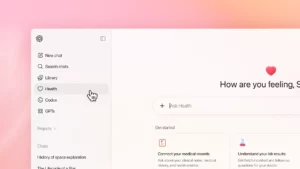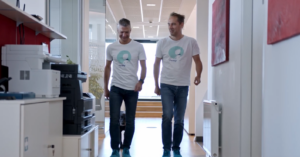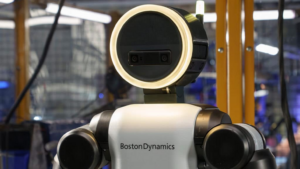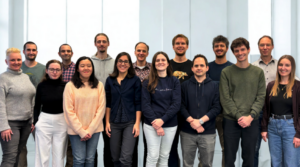The Big Reset with Georgi Kamov: The Path to Real and Sustainable Social Innovation
Seven years ago, Georgi Kamov wrote a book called Destination Number One, and his main thesis there was that given the fact that Bulgaria is a country with many social challenges it could easily turn into a destination for social innovation. The book was written amid another totally different political crisis. Has his vision changed now as we are facing a healthcare and economic crisis? Kamov started his career with tackling foreign policy in the state administration, then moved to the social sector and ended up in the business, where he is a consultant in innovation and design thinking.
Trending Topics: So seven years ago you wrote that book. It was in the middle of a totally different crisis. What does this vision look like from today’s perspective?
Georgi Kamov: The book that I wrote was kind of an experiment for me. An interesting experiment. I started writing it a few months before the biggest anti-corruption protests in recent memory in Bulgaria, which came after the parliamentary elections then. My motivation was simply to gather things that I have observed and some thoughts that I had, and everything kind of clicked in the place. I saw a gap in our view of Bulgaria, on how we perceive our country and I decided to make an attempt to fill that gap with something, on one side realistic but also optimistic. I wanted desperately to have a happy ending, but a realistic one. Actually the elections happened and the protests followed and, as I published the text in the very evening after the elections, there was a huge wave of enthusiasm. What actually followed was not another text, but I started doing other things. Things related to some of the main challenges that I have described. One of the biggest things that came also out of this, in the 7 years that followed, was my work in education. Apart from some concrete projects that I did with people who were really interested in the text and wanted to make something out of it, I guess the main contribution that I have is my work in education with the startup that I co-founded with my wife ‘Red Paper Plane’. It is about bringing project-based learning to schools and families all over Bulgaria. We have right now hundreds of teachers and thousands of parents who do things with our projects, from really small villages to the capital and big cities. So, this is the main contribution that I had. But, I have been contemplating about a follow-up, focused on the EU. The basic idea there is the main role of the EU should be to enable people, communities, companies, social organizations, basically, all members of society to get much better at solving problems together. Who knows, maybe after all that has happened in the last few years, from Brexit to this outbreak right now, this year might be the one that I should publish this follow up text focused on Bulgaria.
+ Read Destination Number One here +
How have things changed ever since you published that book, particularly in the Bulgaria ecosystem?
A lot of things have changed in the past 7 years. Some of them didn’t change as much as we wanted to. The basic problems that we have in society and which we are maybe tired of listening about, are the same. The response of some of the people to these challenges has changed though. We saw a number of initiatives in the past couple of months related to the coronavirus outbreak and we saw that this situation prompted different responses. Some people or communities the responses were fear and anxiety, but as we saw in Bulgaria and many places elsewhere around the world, the responses can prompt empathy, creativity, and new solutions. I am afraid that many of these are driven only by the current situation and the results won’t last. We saw something like this happening in periods of time when we had social problems and people started to recognize that we need new solutions. For every new initiative that actually changes the lives of people for the better, there are hundreds or even more that didn’t work and vanished, they just disappeared. So, if we want to see a real tangible impact of these new solutions to social problems, we basically need thousands of people from all walks of life and all spheres actively creating them and participating in them.
What would be the key to making many people be part of that from your point of view?
We should start getting better at solving problems together. I think that’s the short answer. And by we I don’t mean just the people close to us or the people that have the same social status, or the people that have the same background like us, actually on the contrary, we should work with people that have opposing views, that have radically different lives, that can provoke each other in the best sense of the word. But we also need, I think, one crucial thing that definitely hasn’t changed in the past 7 years -we should stop outsourcing the solutions of our social problems to our state institutions. It is not the state that should improve our quality of life with us simply sitting and watching from the sidelines. It is actually the other way around. It is us that should kick start the process, pushing the state to react, to respond and to adjust to what we provide. And we haven’t really pushed that much in terms of let’s say content. We have pushed in terms of protests, demands, and some of the campaigns launched related to either the social problems or environmental problems that have been really successful. We need to push more in terms of our approach to solving problems together.
I remember in the book you compared the state to a startup with 6M users and absolutely no business plan, I found it a quite good comparison. We are a bit remaining on the surface in a way and I really like to dig a bit deeper and be a bit more specific about what could be those social initiatives we talk about? Can we outline 3 problems or even solutions that we need to proactively push to the state? Have you thought about that?
Some of the things that come to my mind right now are not exactly problems, I guess, but more like directions for actions that we need to take. Concrete things that we may tackle and should spur concrete actions are more like guidelines. So you have these in mind while creating new solutions. And if you have these in mind you will probably start to link solutions together or to have certain criteria through which you view most of the problems and the solutions, and you can say – ok this doesn’t really fit our direction and our purpose, should we invest time, money and people into that or we should switch to something else. I can give you things that would be possible directions for actions if we want to have more social innovation in Bulgaria and we believe that we need new solutions to social problems. One would be to find ways to help children, especially 4 to 10 years old, parents and teachers to actually apply those famous 21st-century skills that we read and listen for so much about, right here right now. Actually even in spite of education they receive and the environment they live in, and I mean both the social and the natural environment, can we find ways to provide children, especially in the early formative years of life, with ways to actually learn and apply these 21st-century skills that go beyond traditional education. All of those things will be crucial in their lives. That would be number one.
Interesting. With Red Paper Plane you are doing things in that direction, right? But I wonder how do you make something like this available for more people and make more people join it?
One of the ways to do it is actually to ask yourself do we really want this applied in every school, in every family, with every child. First, is this realistic, and second, do we actually need that? Because what we see is that – we have the best parents and teachers in the world that come to do our programs, but they usually come to us. We don’t push everyone to participate with let’s say mass marketing or something like that. They actually come to us because they realize we provide something of value for them. And we maybe don’t really want to see this mass adopted, we probably want to see this adopted in a sufficient way but maybe to see the approach adopted. There should be 10s of startups like ours, creating content that is valuable and goes beyond simply adopting content for the current educational system. Some of them might be startups that are coming out of Bulgaria and they are focused on Bulgaria as a potential market, some of them might be born here, some of them might be local or national, but the approach is important. There might be better solutions compared to ours, but in order to have the quality, we need quantity first. We need dozens of startups working in actually bringing those abstract 21st-century skills in very specific and concrete ways in different environments and this will be a beneficial thing for all of us in the society.
Education is definitely one of the topics. What are the other directions that you are thinking about?
The second is, it might sound a bit strange (smiles), to search for ways to make the Bulgarian countryside the best place to work, live and enjoy life, instead of watching it fall apart. I think that is something we should work on. People from other countries realize this, they come to spend their retirement years in the country, the number increases because they value things they cannot really get at home – relatively unspoiled nature, food, even the contact with local people is more relaxed than in other countries. I am talking about people at all stages of life – students, young families with kids, someone in their mid-40s, to really find ways to make these communities and places liveable with everything that we need to actually live a better live instead of spending it in the city, in traffic jams, packed close to each other in office buildings (in different times, of course). I am always reminded of this when I am traveling in the countryside because in every village in the center you have a kind of rectangular building, which is usually two-floored, the first floor is the supermarket and the second floor is quite often empty. And wherever I see a building like this I am always thinking – “this is the perfect place for a hub in this small village”. There could be classes there, there could be small co-working space there with fast internet access, a café, things that we see in the big city centers in Bulgaria, but we don’t see in the countryside. So, this is just one tiny bit that needs to happen, but at least we already have the buildings for that, so why don’t we try it out.
The third direction would be to solve problems in our cities that go beyond our immediate needs. By immediate needs I mean – I need a place to stay, live, a place to work, a place to shop, these things are really well covered in our cities. There is something that, it’s a fancy scientific term, but I like it, it’s called social cohesion. It is about the ability of members of society to interact with each other and to cooperate and live together not only to prosper, but also to survive. So social cohesion is important not only if we want to develop ourselves and our societies but also to survive. In this current situation we kind of see whether we have good social cohesion or bad social cohesion in Bulgaria with the lockdown measures. Social cohesion is also needed if we go beyond our front door to the places we inhabit while going out from our home to our workplace, from the gas station to the shopping mall. These are all the places that we live in together and they are often outsourced either to private companies or to the states, and we don’t really care about them so much. This quality of live in the cities is what I think we also need to invest in.
Can you give an example of something in that direction?
There are lots of examples. For example, vegetable gardens in between big apartment blocks. Or people gather together to clean up space, or to plant flowers on the street that is simply occupied by cars. Or people who create apps in which we can share problems in the neighborhood. All of these things are up to a kind of social activity and we need to think about multiplying these and see how we can scale them up and help the government or private companies who manage some of these spaces to make them even better.
Building innovation and something that will last longer requires sustainability, also financial sustainability, capital, and investment. In this regard, how can we include the private sector more?
You definitely need investment to scale social innovation. It’s great to see the startup sphere as a really active part of our business life. What we would like to see, of course, is to have a similar thing for more socially orientated projects or building these social elements in the startup sector itself. One approach is to separate business innovation and social innovation and see how they will figure it out separately. Another approach is to try to infuse more this lively startup sector by making every startup think more about what’s their social take and their tackling. By social take I don’t mean something that big companies usually do – we do whatever we do but we will somehow balance it with a fancy CSR (corporate social responsibility – ed.n) initiative. Or a startup that says ‘we are focused on a certain platform that will tackle a certain problem and we are kind of not having any social angle’. Everybody has a social angle. Even the domain provider you are using, or the project management system you are using could be important in social innovation. Because if it is a company that has data servers, for example, using fossil fuels, they should know that if they are a reputable company, it is the worst choice that a company that uses sustainable energy for that. Even those things that remain totally hidden for most people in the background could play a role.




























